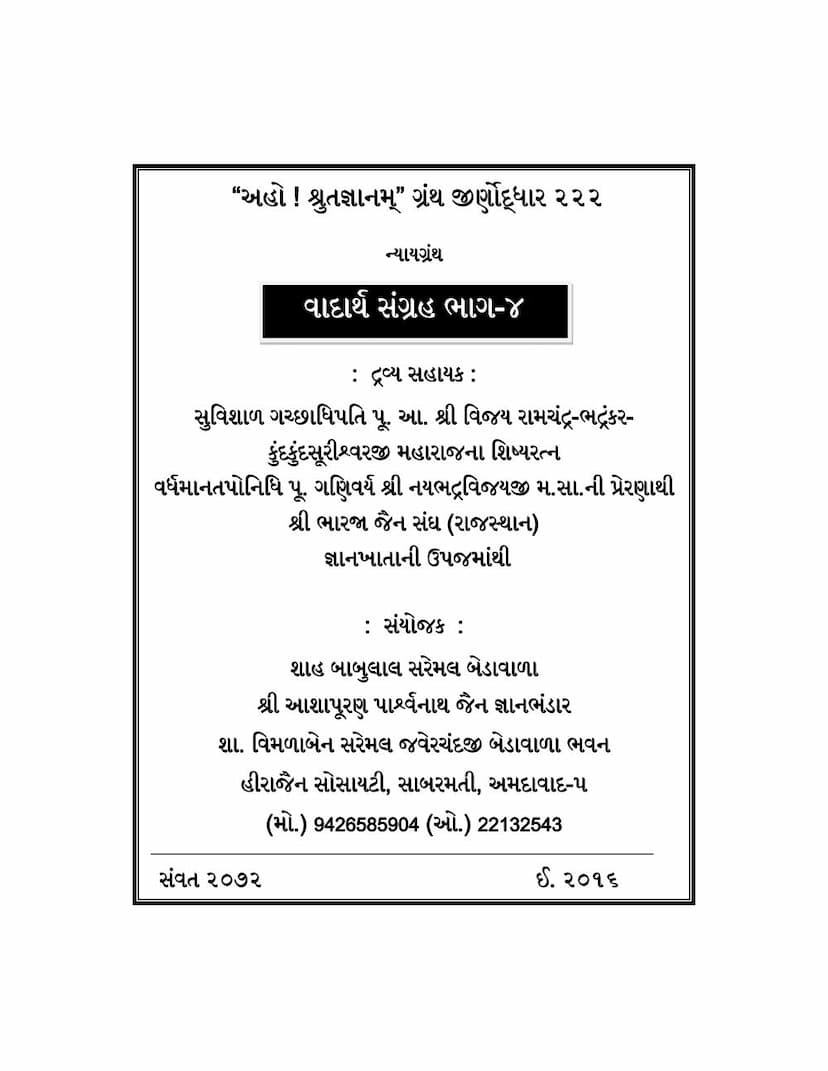Vadarth Sangraha Part 04 Aakhyat Shaktivad Cha Tika
Added to library: September 2, 2025

Summary
Here's a comprehensive summary of the Jain text "Vadarth Sangraha Part 04 Aakhyat Shaktivad Cha Tika" by Mahadev Gangadhar Bakre, based on the provided pages:
Book Title: Vadarth SangraPha Part 04, Aakhyat Shaktivad Cha Tika Author: Mahadev Gangadhar Bakre Publisher: Gujarati Printing Press Core Subject: This text is the fourth part of the "Vadarth Sangraha" series, focusing specifically on the philosophical concept of "Aakhyat Shakti" within the framework of Indian logic and grammar, particularly as interpreted within Jain traditions. It delves into the power and function of verbs (आख्यात - aakhyāt) in expressing action and its nuances. The text includes extensive commentaries (Tika) on this topic.
Key Focus: Aakhyat Shakti (The Power of Verbs)
The central theme of this volume is the analysis of the "Shakti" (power, force, or meaning-conveying capacity) inherent in verbs (आख्यात - aakhyāt). The author and commentators explore how verbs function to convey meaning, particularly in relation to:
- Action and Meaning: The text meticulously examines how verbs are not merely grammatical elements but carry significant philosophical weight in understanding reality. They discuss the intrinsic power of verbs to denote action, events, and the underlying essence of these.
- Grammatical and Philosophical Interpretation: The work is deeply rooted in Indian philosophical traditions of Nyaya (logic) and Mimamsa (hermeneutics), as well as grammatical theories. It aims to reconcile grammatical rules with philosophical interpretations of reality as expressed through language.
- Commentaries (Tika): The book features six different commentaries on the "Aakhyat Shakti" of Raghunath Shiromani Bhattacharya. This indicates a thorough and multifaceted exploration of the subject, with each commentator likely offering a unique perspective or elaboration on the original text. The commentaries are attributed to:
- Mathuranath (Aakhyat-vada-rahasya)
- Ramchandra (Aakhyat-vada-tippani)
- Raghudeva (Aakhyat-vada-tippani)
- Jayaram (Vyakhyā)
- Nyaya-Vachaspati (Vyakhyā)
- Ramkrishna (Vyakhyā)
Key Concepts Discussed (Implied from the extensive citations and philosophical discourse):
While a detailed conceptual breakdown requires deeper linguistic analysis of the Sanskrit/Gujarati text, the introduction and pages suggest discussions around:
- The Nature of Shakti: What is the power of a word, especially a verb, to convey meaning? Is it inherent, conventional, or derived?
- Verb's Role in Causality and Agency: How do verbs relate to the performer of an action (karta) and the object of action (karma)? How do they express the relationship between cause, effect, and agent?
- Temporal Aspects: How do verbs convey tense (past, present, future) and how does this relate to their power?
- Theories of Meaning: The text likely engages with different theories regarding how words, particularly verbs, acquire and convey meaning, possibly contrasting grammatical perspectives with philosophical ones.
- Grammatical Categories: The discussions might touch upon the grammatical categories related to verbs like tense (lakaras), conjugations (típ, etc.), and their philosophical implications.
- Distinction between Action and State: The text might explore the difference between expressing an action itself versus expressing the state of being or the consequence of an action.
- The Role of "Kṛ" (कृ) and "Karoti" (करोति): The text highlights the analysis of the root "kṛ" (to do) and the verb "karoti" (does) as crucial in understanding the meaning of verbs (aakhyat). This suggests a deep dive into how these fundamental verbs function as explanations or exemplars for other verbs.
- "Vivaraṇa" (विवरण - Explanation/Elaboration): The concept of "vivaraṇa" is used to explain the power of verbs. This suggests a method of defining or clarifying verb meanings through other words or phrases.
- "Vyutpatti" (व्युत्पत्ति - Derivation/Etymology/Understanding): The process of understanding the meaning of verbs through their etymology and usage is discussed.
- "Bādhaka" (बाधक - Hindrance/Objection): The text anticipates and addresses potential objections or contradictions in interpreting verb meaning.
- "Anukūla Vyāpāra" (अनुकूल व्यापार - Favorable/Conducive Action): This term appears frequently, suggesting a focus on verbs describing actions that lead to a specific result or state, and how this "favorable action" is conveyed.
- "Nirūḍha Lakṣaṇā" (निरूढलक्षणा - Established Metaphor/Idiomatic Meaning): The concept of established idiomatic meanings is also touched upon, suggesting that verb meanings can evolve beyond literal interpretations.
Context and Significance:
The book is part of a larger project of restoring and digitizing ancient Jain and Indic texts, as indicated by the "Aho ShrutaGyanam Granth Jirnodhar" (अहो श्रुतज्ञानम् ग्रंथ जीर्णोद्धार) entries on pages 2 and following. The "Shri Ashapuran Parshvanath Jain Gyan Bhandar" (श्री आशापूरण पार्श्वनाथ जैन ज्ञान भंडार) is credited with making these rare and often inaccessible texts available, primarily through scanned DVDs and online downloads. The "Vadarth Sangraha" series itself seems to be a foundational text in Jain logic and philosophy, with this volume focusing on a critical aspect of language and its philosophical implications.
In Essence:
"Vadarth Sangraha Part 04: Aakhyat Shakti" is a scholarly treatise that meticulously analyzes the semantic and philosophical power of verbs within the Indian grammatical and logical tradition, with a specific Jain perspective. It offers a comprehensive examination through multiple expert commentaries, aiming to clarify the complex role of verbs in expressing action, agency, and the deeper meaning of reality. The work is significant for its contribution to understanding the nuances of language in philosophical discourse and is part of a vital effort to preserve and disseminate ancient Indian knowledge.